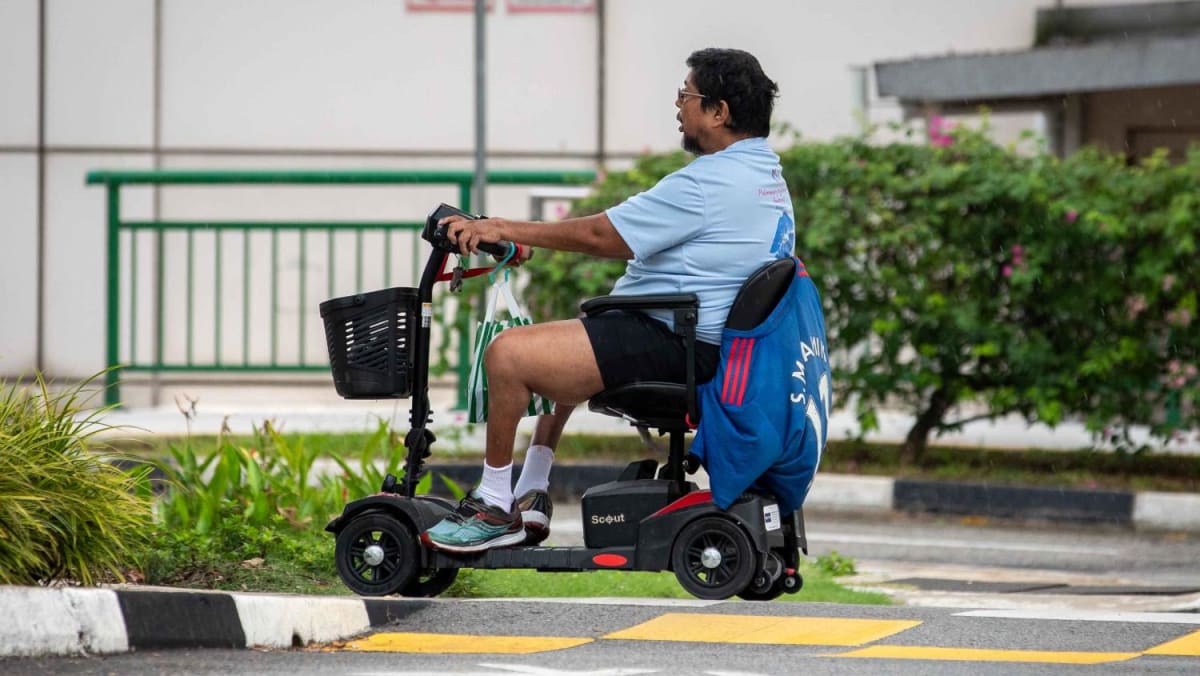
SINGAPORE — To curb the misuse of personal mobility aids (PMAs) by able-bodied persons, only people certified by a medical professional to have problems walking will be allowed to use mobility scooters, if a new set of recommendations is accepted by the Government.
In a report published on Thursday (Dec 14), the Active Mobility Advisory Panel that oversees the safe use of active mobility devices set out five key recommendations to ensure the safe and responsible use of such units.
PMAs refer to manual wheelchairs, motorised wheelchairs and mobility scooters, designed and intended to carry a person who has difficulty walking.
The recommendations were submitted by the panel to the Government on Thursday after a series of focus-group discussions with various stakeholders in June and July.
The stakeholders consulted included PMA users, caregivers, representatives from a disability-focused organisation and the National Delivery Champions Association, which represents freelancers and self-employed persons whose main source of income is from food delivery or package delivery.Speaking at the sidelines of a media briefing on Thursday, the panel’s chairman Baey Yam Keng said that the Government will review the recommendations and consider implementation at a later date.
Mr Baey is also Senior Parliamentary Secretary for Transport.
WHY IT MATTERS
The use of PMAs is subjected to relatively lax regulation. Users are not allowed to go on the roads and are subject to a maximum speed limit of 10km/h.
Unlike personal mobility devices such as electric scooters, PMAs are allowed on footpaths and at void decks of public housing blocks.
The panel said that it decided to review such devices because there have been increasing concerns about the misuse of these units, especially mobility scooters, by able-bodied persons.
These include the use of overly large devices and using them in an unsafe manner such as by speeding. Mr Baey said: “The Active Mobility Advisory Panel decided to review the current guidelines in order to pre-empt a situation where there are a lot of disamenities or accidents happening and that would affect genuine users from continuing the use of PMAs.”
TODAY has asked the Land Transport Authority (LTA) for figures on incidents or complaints relating to the irresponsible use of PMAs.
People with a genuine need for such mobility aids have also found that these problems have “tarnished the reputation of PMA users”, the panel said.
It reviewed practices done in other jurisdictions such as in Australia, Spain and the United Kingdom before coming up with the recommendations.
Including Mr Baey, the panel has 16 members who are representatives from LTA, National Parks Board, the Traffic Police and a non-profit organisation focused on people with disabilities.
TODAY takes a look at the panel’s five main recommendations in the report and the considerations behind them.
MEDICAL CERTIFICATION REQUIRED
The panel recommended allowing only users who are certified to have medical needs or walking difficulties to use mobility scootersThis can be in the form of a memo from a registered medical professionalHowever, users who already have an existing certification or disability identification will not have to go for more assessments The recommendation applies only for mobility scooters, because the feedback of abuse among able-bodied users are typically linked to such units onlyThis targeted approach aims to minimise the impact on users with genuine need who are using manual and motorised wheelchairsThe panel said that it did not recommend having a blanket allowance by age, because it may lead to a proliferation of PMA usage
LOWER SPEED LIMIT
The panel recommended lowering the maximum device speed for all motorised PMAs to 6km/h from the current 10km/h to better reflect the intended use of these units, which is to replace walking for their usersTransitionary measures should be put in place to allow genuine users to use their existing PMAs but at a lowered speedRetailers will be required to sell PMAs with a maximum speed of not more than 6km/h, with reasonable transition time given to them to make necessary changes to their business
RESTRICTED SIZE OF MOBILITY SCOOTERS
The existing dimension restrictions on PMAs for public transport should apply to devices used on public paths, the panel saidLTA imposes a dimension restriction of 70cm by 120cm by 150cm with a 300kg laden weight for PMAs on public transportA small proportion of users who may need to use bigger PMAs for medical reasons will be exempted from this requirement
MORE AWARENESS
The panel recommended that public education efforts be ramped up on who can use PMAs, along with the rules and regulationsUsers should also be educated on the code of conduct when using these units when sharing paths with other usersSafe usage of PMAs, fire safety tips and safe charging practices should also be taughtEnforcement should be stepped up with appropriate penalties to deter the sale of non-compliant devices, the panel said